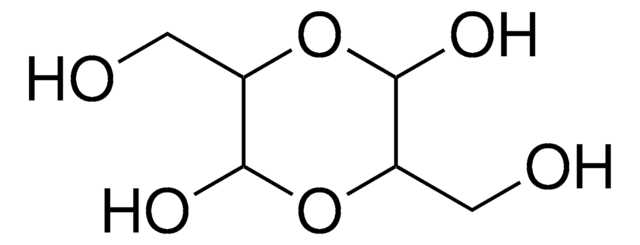49426
DL-Lactaldehyde solution
~1 M in H2O
Synonym(s):
2-Hydroxypropanal solution, 2-Hydroxypropionaldehyde solution
Sign Into View Organizational & Contract Pricing
All Photos(1)
About This Item
Empirical Formula (Hill Notation):
C3H6O2
CAS Number:
Molecular Weight:
74.08
Beilstein:
1719827
MDL number:
UNSPSC Code:
12352106
PubChem Substance ID:
NACRES:
NA.25
Recommended Products
Assay
≥95% (TLC)
Quality Level
concentration
~1 M in H2O
storage temp.
−20°C
SMILES string
[H]C(C(O)C)=O
InChI
1S/C3H6O2/c1-3(5)2-4/h2-3,5H,1H3
InChI key
BSABBBMNWQWLLU-UHFFFAOYSA-N
Looking for similar products? Visit Product Comparison Guide
Biochem/physiol Actions
D-Lactaldehyde is an intermediate in the pyruvate metabolic pathway. Pyruvaldehyde is irreversibly produced from D-lactaldehyde via the enzyme glyoxylate reductase. L-lactaldehyde is an intermediate metabolite in the pyruvate metabolism pathway and is irreversibly produced from pyruvaldehyde via the enzyme aldehyde reductase, which is then irreversibly converted to propylene glycol via aldehyde reductase.
Signal Word
Warning
Hazard Statements
Precautionary Statements
Hazard Classifications
Eye Irrit. 2 - Skin Irrit. 2
Storage Class Code
10 - Combustible liquids
WGK
WGK 3
Flash Point(F)
Not applicable
Flash Point(C)
Not applicable
Choose from one of the most recent versions:
Already Own This Product?
Find documentation for the products that you have recently purchased in the Document Library.
Customers Also Viewed
Melina Kerou et al.
Proceedings of the National Academy of Sciences of the United States of America, 113(49), E7937-E7946 (2016-11-20)
Ammonia-oxidizing archaea (AOA) are among the most abundant microorganisms and key players in the global nitrogen and carbon cycles. They share a common energy metabolism but represent a heterogeneous group with respect to their environmental distribution and adaptions, growth requirements
Manuela Centanni et al.
Applied and environmental microbiology, 85(7) (2019-01-27)
Infants fed breast milk harbor a gut microbiota in which bifidobacteria are generally predominant. The metabolic interactions of bifidobacterial species need investigation because they may offer insight into the colonization of the gut in early life. Bifidobacterium bifidum ATCC 15696
Lingfeng Zhu et al.
Applied microbiology and biotechnology, 100(3), 1241-1251 (2015-10-12)
The pure stereoisomers of 1,2-propanediol (1,2-PDO) could be used as starting materials to synthesize high value-added specialty chemicals and chiral pharmaceutical products. As the stereoisomers of 1,2-PDO cannot be obtained by traditional chemical synthesis processes, biotechnological processes have gained increasing
Min-Kyu Kwak et al.
Biochimica et biophysica acta, 1862(1), 18-39 (2017-10-12)
High methylglyoxal content disrupts cell physiology, but mammals have scavengers to prevent glycolytic and mitochondrial dysfunctions. In yeast, methylglyoxal accumulation triggers methylglyoxal-oxidizing alcohol dehydrogenase (Adh1) activity. While methylglyoxal reductases and glyoxalases have been well studied in prokaryotes and eukaryotes, experimental
Robert H White et al.
Biochemistry, 45(40), 12366-12379 (2006-10-04)
A biosynthetic pathway is proposed for creating 6-deoxy-5-ketofructose-1-phosphate (DKFP), a precursor sugar for aromatic amino acid biosynthesis in Methanocaldococcus jannaschii. First, two possible routes were investigated to determine if a modified, established biosynthetic pathway could be responsible for generating 6-deoxyhexoses
Our team of scientists has experience in all areas of research including Life Science, Material Science, Chemical Synthesis, Chromatography, Analytical and many others.
Contact Technical Service














